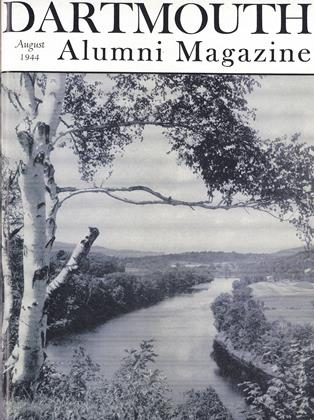GEORGE MATTHEW ADAMS, who has given Dartmouth College many of his finest books, recently sent up a collection of the works of Michael Fairless. She is most famous for her book TheRoadmender, which, I am told, has sold over half a million copies. Do you know it? If not look it up.
He also called my attention to a book I had let slip by, called I Am JonathanScrivener. This novel, by Claude Houghton is remarkably good, and is reminiscent of another book, famous and still unforgotten, Norman Davey's The Pilgrim of a Smile. Try them both if they are not known to you.
James Norman Hall's Lost Island (1944) is the tragic story of how "progress" and "civilization" came during this war and destroyed a small island in the South Pacific. Told unsentimentally, this is a moving story and one which has a moral, though what the moral is I wouldn't care to say. Cunninghame Graham would have liked this book, as readers of his work will understand.
A bargain, and most enjoyable reading, is the portable Dorothy Parker, a volume of 512 pages of the prose and verse of this typically American writer. Most of it you may have read before but there are some new stories. Only $2.
Howard Hunt in Limit of Darkness (Random House) has written about what happens in the lives of a handful of fliers on Henderson Field, Guadalcanal, in one day beginning at five a.m. and ends with a description of a raid on Kahili at the southern end of Bougainville, well known by now to a good many Dartmouth men. He is at his best when he describes the heat, dust, dampness and decay of the tropics; he is rather trite when he delves into the men's memories of peaceful life. Nevertheless, this is a good story, and in many ways is better than his earlier East of Farewell, described as the first novel about this war written by a participant. You may remember this as a story of a North Atlantic destroyer. Frank Garran '42 was on this destroyer with Hunt, who is now in the Army Air Forces. Garran stayed in the Navy and is now a full lieutenant.
Colonel Drake, well known New York bookseller, gave me Robert Wilder's Mr.G Strings Along to read coming up from New York. It begins well and tapers off a bit disappointingly at the end. However, there is some amusing stuff in it, and some innocent fun is poked at a few of our Washington administrators. Business men should eat this up.
There are a good many men in their middle forties who fought in the last war and who got commissions in World War 11. Many have been disillusioned about the kind of service they have had owing to their advanced age; some have been more fortunate. Donald Hough, a good writer, has told his story very well in Captain Retread. Hough compares his experiences in this war with the last, and gives an excellent and most sympathetic picture of the American soldier. His picture of the Air Force training in the western desert at Yuma is a highlight. Published by Norton.
I still think the best one-volume history of the United States to be James Truslow Adams' The Epic of America. But the iaie Stephen Vincent Benet's posthumous volume America is worthy of a place beside it. Benet wrote this interpretive history at the request of the Office of War Information. It is written to help foreigners and others to understand what we stand for; what our tradition is, and what we represent in the postwar world. In 122 pages Benet writes of our democracy. I hope the future will prove that we also practice what we supposedly stand for.
Parents who have sons in Naval Aviation will want to read Lieutenant Max Miller's Daybreak for our Carrier. Rear Admiral Davis describes it as a symbol of "the heartening crescendo of our aircraft carrier power in the war in the Pacific." As I write, the Battle of Saipan is taking place. Miller tells you how these naval wars fought in the air take place with the ships hundreds of miles apart. A book excellently illustrated with official Navy pictures.
Dr. John F. Gile '16 recommends Frances Parkinson Keyes' Also the Hills. Part of the locale of this novel is well known to Dartmouth men as it lies a few miles north of Hanover. Well worth your time.
 View Full Issue
View Full Issue
More From This Issue
-
 Article
ArticleA TEACHING LIBRARY
August 1944 By NORMAN K. ARNOLD -
 Article
ArticleTHE HISTORIC COLLEGE
August 1944 -
 Article
ArticleALUMNI OFFICERS MEET
August 1944 -
 Article
ArticleTHE 50-YEAR MESSAGE
August 1944 By REV. CHARLES C. MERRILL '94 -
 Class Notes
Class Notes1904
August 1944 By DAVID S. AUSTIN II, THOMAS W. STREETER -
 Article
ArticleMAN WITH COW SENSE
August 1944 By A. P.
HERBERT F. WEST '22
-
 Article
ArticleHanover Browsing
April 1939 By HERBERT F. WEST '22 -
 Article
ArticleHanover Browsing
June 1939 By HERBERT F. WEST '22 -
 Article
ArticleHanover Browsing
August 1942 By HERBERT F. WEST '22 -
 Article
ArticleA Dartmouth Bookshelf
June 1946 By HERBERT F. WEST '22 -
 Article
ArticleHanover Browsing
May 1947 By HERBERT F. WEST '22 -
 Article
ArticleHanover Browsing
March 1950 By HERBERT F. WEST '22
Article
-
 Article
ArticleAlumni Fund Chairmen
January 1946 -
 Article
ArticleMilestones
July 1951 -
 Article
ArticleWith the Big Green Teams
DECEMBER 1967 -
 Article
ArticlePLAYERS' AMBITIONS CONTINUE UPWARDS
October 1939 By Charles Bolte '41 -
 Article
ArticleProfessor On the Go
FEBRUARY 1970 By W.R.M. -
 Article
ArticleThayer School
March 1942 By Wm. P. Kimball '29

